Overview of Philadelphia Net Profits Tax (NPT)
The Philadelphia Net Profits Tax (NPT) applies to residents and non-residents with income from self-employment, businesses, or rental activities within the city, separate from BIRT.
1.1 Definition and Purpose of NPT
The Philadelphia Net Profits Tax (NPT) is a local tax on net earnings from self-employment, businesses, or rental activities conducted within the city. It applies to residents and non-residents alike, targeting income derived from Philadelphia-based operations. The purpose of NPT is to tax the profits of individuals and entities, ensuring fair contribution to city services and infrastructure. It is distinct from other taxes like BIRT, focusing solely on net profits rather than gross receipts or income. This tax helps fund municipal programs and maintain public amenities.
1.2 History and Evolution of NPT in Philadelphia
The Philadelphia Net Profits Tax (NPT) was established to generate revenue for city services. Its origins trace back to the mid-20th century, with periodic adjustments to tax rates and eligibility criteria. Over the years, the tax has evolved to accommodate economic changes, including reductions in tax rates during the 2000s. Recent updates, such as those related to COVID-19 relief, have further refined its application, ensuring it remains a vital source of funding for Philadelphia’s infrastructure and public programs.
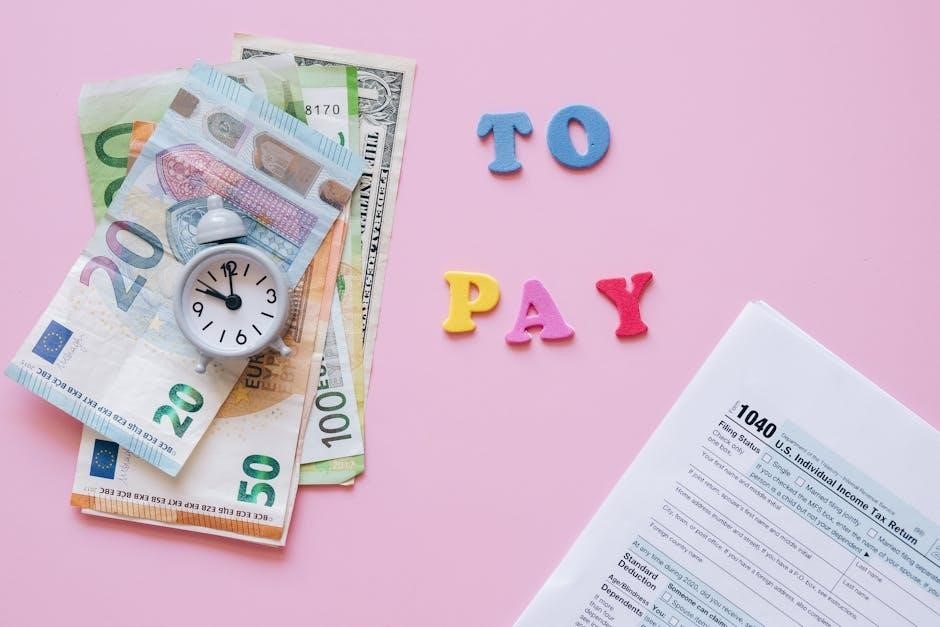
Eligibility Criteria for NPT
The NPT applies to Philadelphia residents with self-employment income and non-residents conducting business in the city, ensuring fair taxation based on income sources within Philadelphia.
2.1 Who Must File NPT? (Residents vs. Non-Residents)
Philadelphia residents engaged in self-employment or business activities must file NPT, regardless of where the business is conducted. Non-residents with business income earned within Philadelphia are also required to file. This ensures that all individuals benefiting from the city’s economic opportunities contribute to its tax base. The tax applies to net profits derived from Philadelphia-based activities, making it applicable to both resident and non-resident taxpayers alike.
2.2 Specific Groups Subject to NPT (Self-Employed, Landlords, etc.)
The NPT applies to self-employed individuals, landlords, and other entities generating income from Philadelphia-based activities. Self-employed individuals, including freelancers and independent contractors, must report net profits. Landlords with rental income from Philadelphia properties are also subject to NPT. Additionally, businesses structured as partnerships or sole proprietorships fall under this tax. The tax is calculated based on net profits derived from Philadelphia-specific income, ensuring that all eligible groups contribute to the city’s revenue.
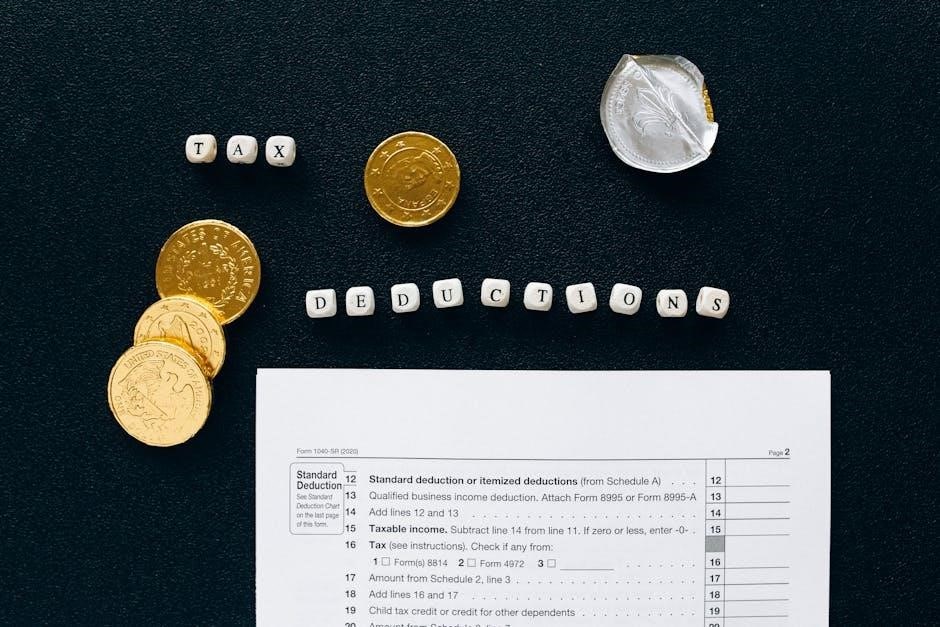
Calculation of Net Profits Tax
The Net Profits Tax is calculated based on taxable income, applying a 3.92% rate to net profits after allowable deductions and exemptions.
3.1 Tax Base and Rate Structure
The tax base for Philadelphia Net Profits Tax includes net income from businesses, self-employment, and rental activities. The tax rate is 3.92% of net profits after deductions.
3.2 Deductions and Exemptions Allowed
Deductions for NPT include business expenses, rent, and operating costs. Exemptions apply to small businesses with gross income under $100k and low-income individuals meeting specific criteria.
Filing Requirements and Forms
The Philadelphia Net Profits Tax Return is mandatory. Forms are available on the City of Philadelphia’s Department of Revenue website. Deadline is April 15, with online or in-person submission options.
4.1 Mandatory Forms for NPT (Philadelphia Net Profits Tax Return)
The Philadelphia Net Profits Tax Return is required for all eligible individuals and businesses. Obtain forms from the City of Philadelphia’s Department of Revenue website. Complete the forms based on rental income and expenses. Ensure accuracy in reporting all applicable income and deductions. Forms must be submitted annually by April 15 or the next business day if the 15th falls on a weekend. Proper completion ensures compliance and avoids penalties.
4.2 Deadlines and Payment Schedules
The first installment of the Net Profits Tax is due by April 15 of each year, with the second installment due by June 15. Each payment must equal 25% of the prior year’s Net Profits Tax. The final payment is due by April 15 of the following year. Missing deadlines may result in penalties. Ensure timely submissions to avoid additional charges; Proper scheduling helps maintain compliance with the City of Philadelphia’s tax requirements.
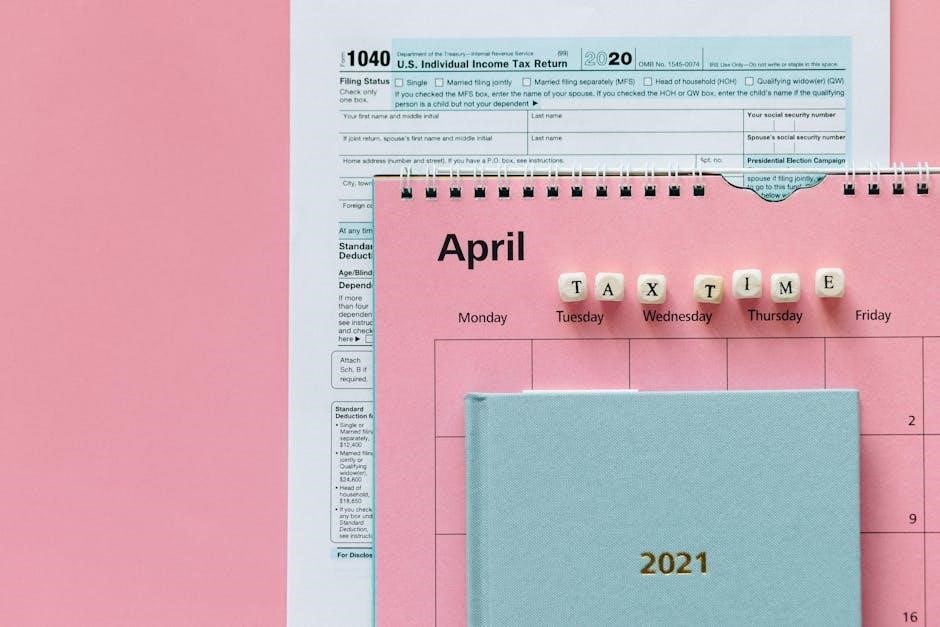
Payment Instructions and Methods
Payments can be made online, in-person, or by phone. The City no longer accepts wage tax payments through Official Payments. Use approved methods for timely processing.
5.1 How to Submit Payments (Online, In-Person, etc.)
Payments for NPT can be submitted online through the Philadelphia Department of Revenue website, in-person at their office, or by phone. For online payments, visit the official portal and follow the prompts. In-person payments are accepted at the Municipal Services Building. Checks or money orders should be made payable to the City of Philadelphia, including your account number. Phone payments are also available, with confirmation provided upon completion. Ensure timely submission to avoid penalties.
5.2 Installment Plans and Due Dates
Taxpayers can pay NPT in two installments. The first payment is due by April 15, and the second by June 15. Each installment should equal 25% of the prior year’s NPT liability. Payments can be made online, in-person, or by mail. Failure to meet deadlines may result in penalties. For those unable to pay in full, installment plans may be requested through the Philadelphia Department of Revenue, ensuring compliance and avoiding late fees.

Credits and Exemptions
Credits are available for taxes paid to other jurisdictions, reducing NPT liability. Exemptions apply to small businesses and low-income individuals, easing their financial burden.
6.1 Credits for Taxes Paid to Other Jurisdictions
The Philadelphia Net Profits Tax (NPT) allows residents to claim credits for taxes paid to other jurisdictions. This applies to income earned outside Philadelphia but subject to NPT. Taxpayers must provide proof of taxes paid to other states or cities to qualify. The credit reduces the NPT liability, preventing double taxation. However, the credit does not apply to taxes paid under BIRT or the Philadelphia wage tax. Proper documentation must be submitted to claim this credit.
6.2 Exemptions for Small Businesses and Low-Income Individuals
Small businesses with gross receipts under $100,000 may be exempt from certain NPT obligations. Low-income individuals may also qualify for reduced tax rates or exemptions. The City of Philadelphia offers relief programs, such as grants and loans, to support small businesses impacted by economic challenges. These exemptions aim to ease the financial burden on eligible taxpayers while promoting economic growth within the city. Proper documentation and income verification are required to claim these exemptions.
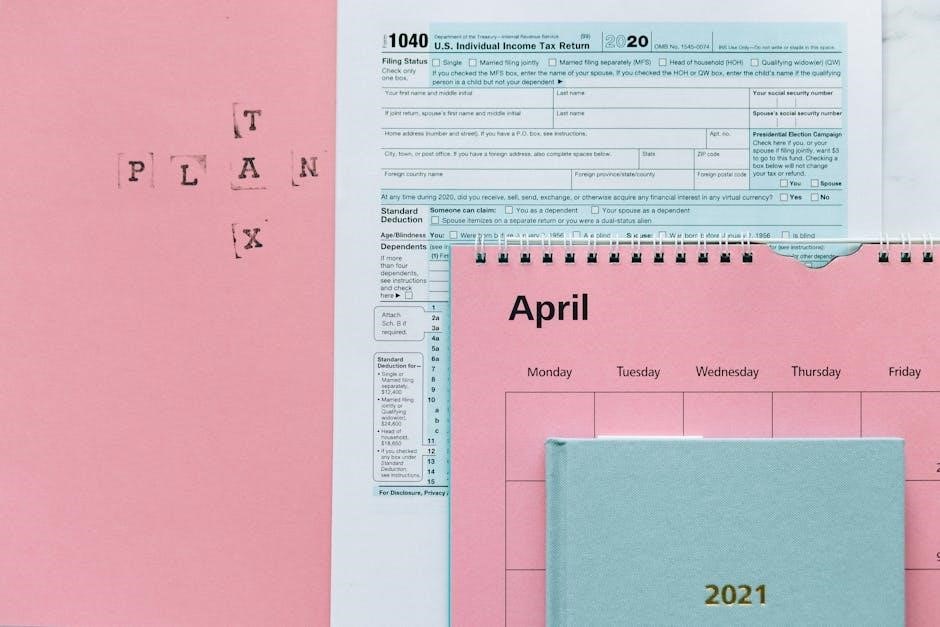
Impact of COVID-19 on NPT
The COVID-19 pandemic led to temporary changes in tax policies, including relief programs for affected businesses. Philadelphia introduced grants and loans to support small businesses during closures.
7.1 Temporary Changes in Tax Policies
In response to COVID-19, Philadelphia implemented temporary tax policy changes, including relief programs for businesses. The city introduced a $9 million grant and loan program to support small businesses affected by closures. Additionally, there were adjustments to filing deadlines and payment schedules to alleviate financial burdens on taxpayers during the pandemic. These measures aimed to stabilize local businesses and individuals impacted by the crisis.
7.2 Relief Programs for Affected Businesses
The City of Philadelphia and PIDC launched a $9 million grant and loan program for small businesses impacted by COVID-19 closures. This initiative provided financial support to stabilize operations and recover from pandemic-related losses. Eligibility prioritized small and minority-owned businesses. Additional relief included tax filing deadline extensions and payment deferrals, offering businesses flexibility in managing cash flow during the crisis. These programs were part of broader efforts to support economic recovery and sustain local businesses.
Relationship Between NPT and BIRT
NPT and BIRT are distinct taxes; NPT applies to net profits, while BIRT focuses on gross receipts. They are calculated separately but may offer reciprocal credits.
8.1 Understanding BIRT (Business Income and Receipts Tax)
The Business Income and Receipts Tax (BIRT) applies to businesses operating in Philadelphia, taxing gross receipts and certain business incomes. It is separate from NPT, applying to both residents and non-residents. Businesses with gross receipts exceeding $100,000 are subject to BIRT, while smaller entities may be exempt. BIRT focuses on revenue rather than profits, distinguishing it from NPT, which targets net earnings. Both taxes may apply to the same income, but they are calculated and filed separately, ensuring distinct compliance requirements for Philadelphia-based businesses.
8.2 How NPT and BIRT Differ
NPT and BIRT are distinct taxes with different focuses. NPT applies to net profits from self-employment or business activities, while BIRT taxes gross receipts and certain business incomes. BIRT has a $100,000 gross receipts threshold for applicability, whereas NPT applies regardless of income level for eligible individuals. Both taxes may apply to the same income but are calculated and filed separately. Understanding these differences is crucial for accurate tax compliance in Philadelphia. NPT and BIRT serve separate purposes, targeting different aspects of business and personal income.

Reporting Business Income
Philadelphia Net Profits Tax requires accurate reporting of all business income, including self-employment, rental, and other profit-generating activities, ensuring proper classification for tax purposes.
9.1 Classification of Income for NPT Purposes
For NPT purposes, income is classified into categories such as self-employment, rental, and business income. Self-employment income includes earnings from freelancing or consulting. Rental income is derived from properties located in Philadelphia. Business income refers to profits from operations conducted within the city. Proper classification ensures accurate tax calculation and compliance with Philadelphia’s tax regulations. It is essential to distinguish between active and passive income, as well as business vs. non-business income, to avoid errors in reporting.
9.2 Documentation Requirements
The Philadelphia Net Profits Tax requires specific documentation to ensure accurate reporting. Taxpayers must submit the Philadelphia Net Profits Tax Return, along with supporting documents such as business and rental income statements. Self-employed individuals should include 1099 forms or invoices detailing their earnings. Partnerships and corporations must provide documentation of each partner’s or shareholder’s pro rata share of profits. Accurate and detailed records are essential to support tax calculations and ensure compliance with the City’s regulations. All necessary attachments must be included to avoid delays or penalties.

Self-Employment and NPT
Self-employed individuals, including freelancers and independent contractors, are subject to NPT on their net earnings from businesses conducted within or outside Philadelphia, based on residency status.
10.1 Tax Implications for Freelancers and Independent Contractors
Freelancers and independent contractors in Philadelphia must report their net income from self-employment under the NPT. This includes income earned both within and outside the city, regardless of where the business is conducted. The NPT applies to residents and non-residents alike, with specific deductions and exemptions available to reduce taxable income. Proper documentation of income and expenses is essential for accurate tax reporting and compliance with city regulations. Failure to file may result in penalties and interest.
10.2 Deductions Available for Self-Employed Individuals
Self-employed individuals in Philadelphia can deduct business-related expenses, such as home office costs, equipment, and professional fees, from their net income. Health insurance premiums for themselves and dependents may also be deductible. These deductions aim to accurately reflect taxable income and reduce NPT liability. Proper documentation is essential to support all claimed deductions, ensuring compliance with city tax regulations and avoiding potential penalties or audits.
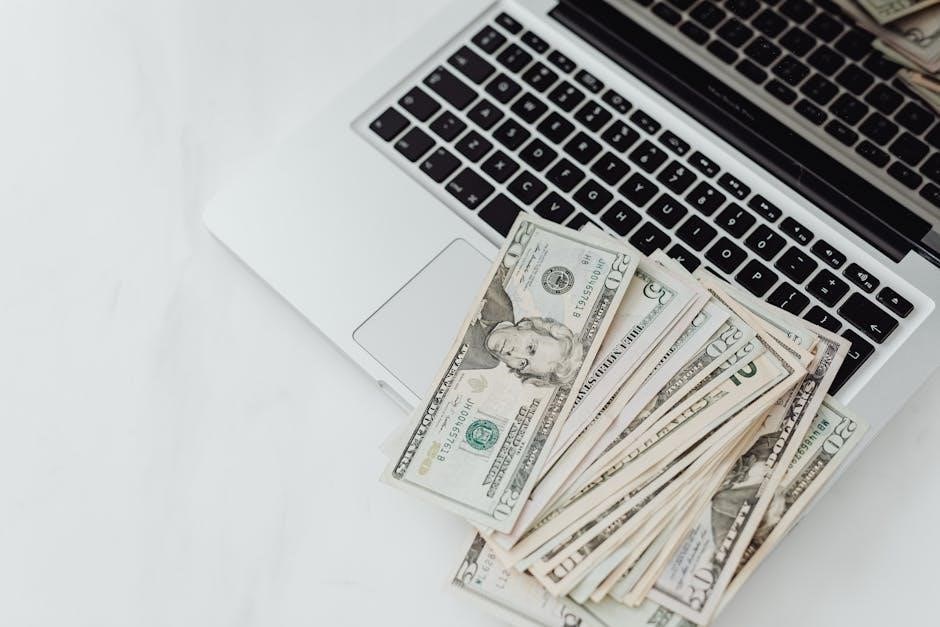
Penalties and Compliance
Failure to pay or file NPT may result in penalties, interest, and potential audits. Compliance ensures accurate reporting and avoids legal consequences.
11.1 Consequences of Late Payments or Non-Compliance
Failure to pay or file NPT on time results in penalties, interest, and potential audits. Late payments incur fines and accrued interest, while non-compliance may lead to legal action. Missing deadlines can also trigger additional fees and complicate tax resolution. Compliance ensures accurate reporting and avoids legal consequences.
11.2 Audit Process and Dispute Resolution
The Philadelphia Department of Revenue conducts audits to ensure compliance with NPT regulations. Taxpayers may receive notices requesting additional documentation or clarification. If disputes arise, the Tax Review Board offers a formal process for resolution. Legal action may be pursued for unresolved issues, emphasizing the importance of accurate filing and prompt response to audit inquiries. Compliance and timely dispute resolution are crucial to avoid further complications and penalties.
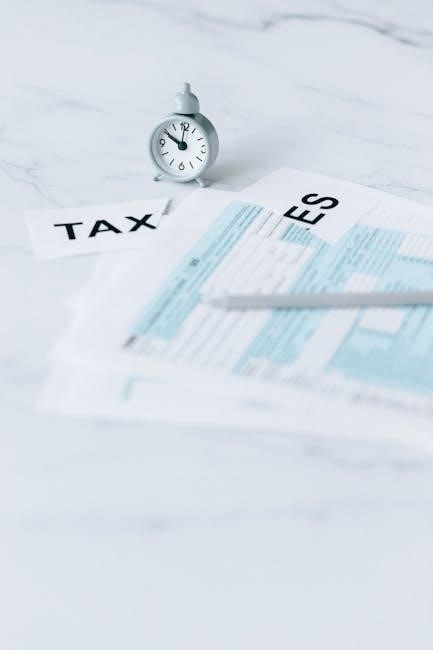
Additional Resources and Assistance
Visit the Philadelphia Department of Revenue website for NPT forms, guides, and contact information. Call or email for support with filing and tax-related inquiries.
12.1 Contact Information for Philadelphia Department of Revenue
The Philadelphia Department of Revenue provides support for NPT inquiries. Contact them at (215) 686-6600 or visit their office at 1401 John F; Kennedy Blvd, Philadelphia, PA 19107. For email assistance, reach out via their website’s contact form. Office hours are Monday through Friday, 8:30 AM to 5:00 PM. Their website offers downloadable forms, payment options, and detailed instructions for filing NPT accurately.
12.2 Recommended Tools and Guides for Filing NPT
The Philadelphia Department of Revenue offers downloadable NPT forms and instructional guides on their website. Utilize tax software like TurboTax or H&R Block for accurate calculations. Online platforms provide step-by-step filing assistance. Refer to the Department’s instructional guide for detailed explanations of eligibility, deductions, and filing requirements. Additionally, consult the City’s FAQ section for common scenarios and solutions to ensure compliance and avoid errors during the filing process.
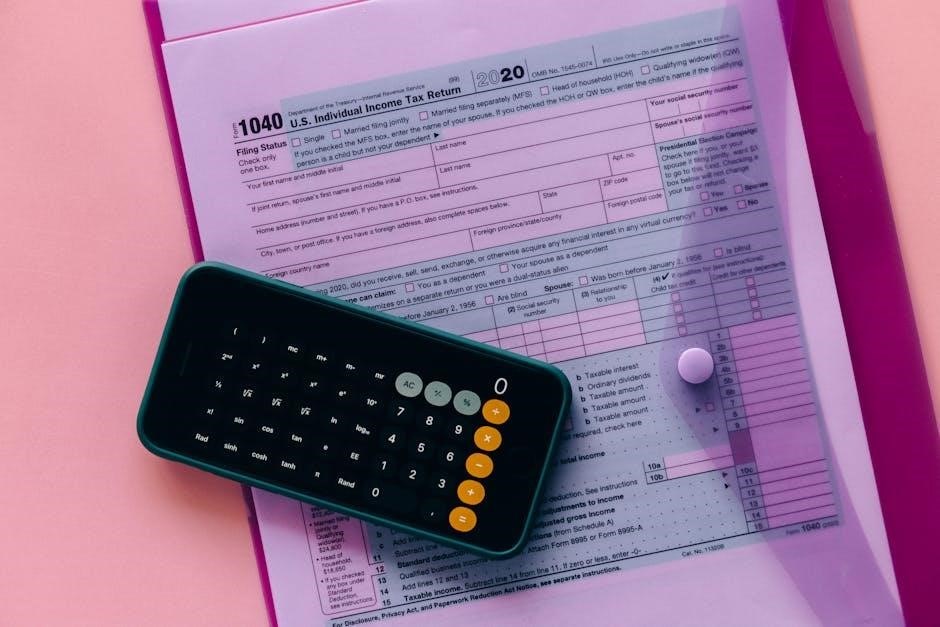
No Responses